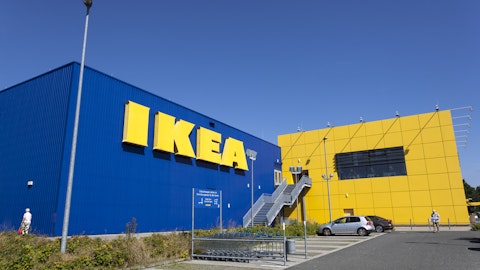Warren Cheng: Thanks, Navdeep. And for my follow-up, I just wanted to ask how you would – if you would step back in your stated margins beyond this year, we’re obviously in a very uncharacteristically high promotional environment. The zero to two comp is clearly below what your typical leverage point would be for fixed costs. Maybe we say shrink is here to stay, but if you just kind of look at all these factors together, how much pressure are you facing on margins this year on sort of these temporary 2023 specific pressures and how should we think about normalized profitability of the business beyond this year?
Navdeep Gupta: Yes, maybe I’ll begin with our confidence in the long-term rubric that we have. We could not be more excited about the long-term growth opportunities that we see from a topline sales perspective or from the bottom-line profitability. The ingredients of our sales and profitability business absolutely remain intact, whether it is our ability to continue to gain share in a $140 billion fragmented industry, the work that we are doing with House of Sport and the next-gen 50k, our recipe or the ingredients that we have called out around the margin continue to remain. Our product is extremely differentiated and very narrowly distributed, and that is what gives us the confidence that we can continue to grow our margins.
Quite frankly, with the 50 basis points of headwind and shrink this year, we are guiding that on a full-year basis, our total gross margin will be higher than 2022. And coming back to your question, that’s what is giving us the confidence that we can continue to grow the topline and the bottom-line in the years to come.
Warren Cheng: Thanks, Navdeep. Thanks, Lauren. Good luck.
Operator: Your next question comes from the line of Michael Lasser from UBS. Please go ahead. Your line is open.
Michael Lasser: Good morning. Thanks a lot for taking my question. So, given that the shrink impact is going to be greater in the second half than it was in the first half, and you don’t take physical inventories until what it sounds like around the middle of the year, we should anticipate that this issue of shrink is going to impact you into at least the first half of next year until you fully anniversary. Is that right?
Navdeep Gupta: Yes, Michael, we are revisiting our physical inventory process based on the learnings that we have had this year. So, we’ll share more, but I don’t anticipate us doing one large inventory count like we did this year. Considering the level of risk, we may actually be counting our stores a little bit more frequently or at least sampling our stores to keep a close tab on the situation.
Michael Lasser: Okay. And then on the House of Sport, two related questions here. Number one, how much of the SG&A growth in the last couple of quarters and really for the full year that you’re expecting is related to a greater fixed cost structure both in the stores as well as what’s necessary in the customer support and store support center to continue to build out these bigger locations. And if you look at the Rochester and the Knoxville locations, which are I believe the first to have been opened and the longest in existence, how do the comps in the last couple of periods at those locations compare to the comps overall for the chain?
Navdeep Gupta: Yes. Michael, great question. First of all, let’s put this in context. We only have 12 House of Sport locations. So, when you think about the overall magnitude of impact on SG&A, I would say it’s pretty insignificant. But the capabilities that we are building in at the corporate – at the support center here in terms of technology and bringing in the right talent to be able to find the opportunities to grow into 2024 and 2025, that’s what the business optimization exercise is about for us, is finding the right talent, resourcing appropriately, and then finding the capabilities that need to be built. So, in terms of the absolute impact on SG&A from the opening of House of Sport location, I would say it’s pretty small.
And now to answer your question, we could not be more excited about the results that we continue to see out of our stores that have been open for some time now, and we couldn’t be more excited about the overall sales and profitability results from those locations as well.
Michael Lasser: Thank you and good luck.
Michael Lasser: Thank you.
Operator: Your next question comes from the line of Brian Nagel from Oppenheimer. Please go ahead. Your line is open.
Brian Nagel: Hi, good morning. So, my first question, with regard to the inventory adjustment you took here in Q2, the outdoor product, so just to understand this clearly, so is that product – the product that you basically wrote down, is that product now sold or were you still anticipating selling that product over the balance of the year? And then I guess the second question there is, we’ve been talking about some weakness in outdoor for a while, but what necessitated the write-down now, or why did you do it now?
Lauren Hobart: Yes, thanks, Brian. So, the product we got aggressive with in Q2 sold very well, and we’ve moved through it such that we don’t have to pack a majority of it away. And we were heading toward a place where we were going to have to do that. So, we’re very, very pleased with how it sold through and moving on. Why go through the product now? There’s seven peak selling weeks in the outdoor category. Obviously, the whole business is a full-year business, but for the subcategories that we’re talking about, there’s seven peak weeks. And so, you have to strike while the iron is hot, and that’s exactly what we decided to do. And again, I am very happy with that decision because it does make our inventory cleaner. We’re down 5% at the end of the year and we don’t have to pack it away.
Brian Nagel: Okay. And then my second question, and it is going to be maybe a little bit bigger picture, but so we’re looking at the release today and you have the inventory issue we just discussed. You have obviously this shrink issue that we’ve been discussing here, which was rather significant. And then you’ve also right-sizing to some extent your labor force. So, there’s a lot here happening in Q2. So, the question I have is, and I get that in your comments, you’re still very upbeat about the longer-term potential for DICK’S and the DICK’S model. But given everything we’re learning today, are you taking a different – or do you have a different perspective on the newer term outlook for DICK’S, the underlying health of this business?
Lauren Hobart: Absolutely not. Absolutely not. No. I would point to, we are doubling our EBT margin. Our sales are 40% higher than they were pre-pandemic. Our EPS is three times what it was. We have a shrink issue and we cleaned up some outdoor inventory. We are completely confident in the future, short-term and long-term of our business.
Brian Nagel: Got it. I appreciate the color. Thanks.
Operator: Your next question comes from the line of Paul Lejuez from Citi. Please go ahead. Your line is open.




